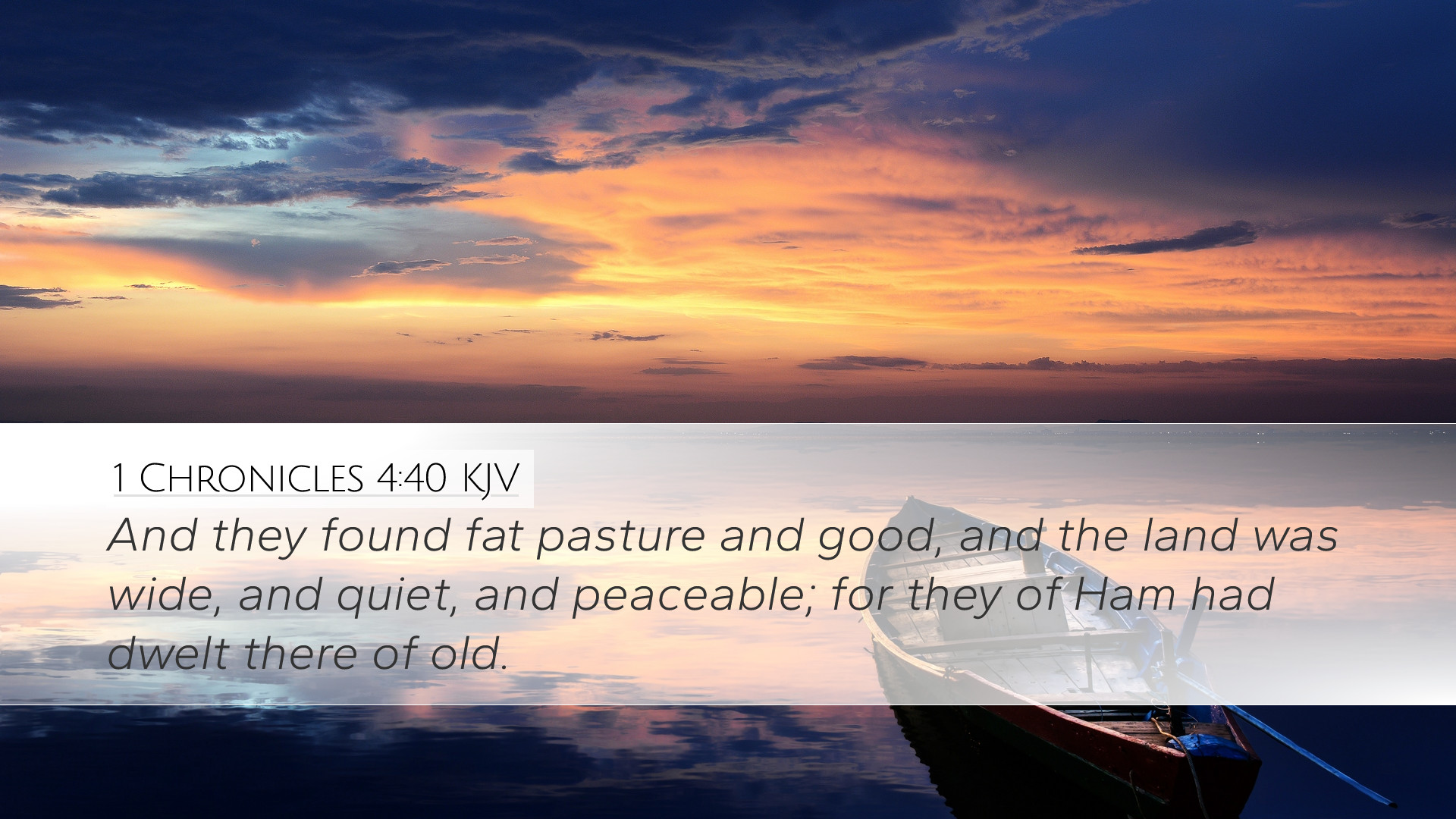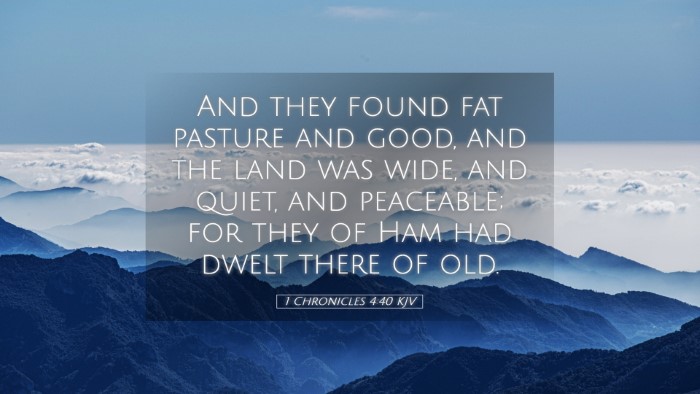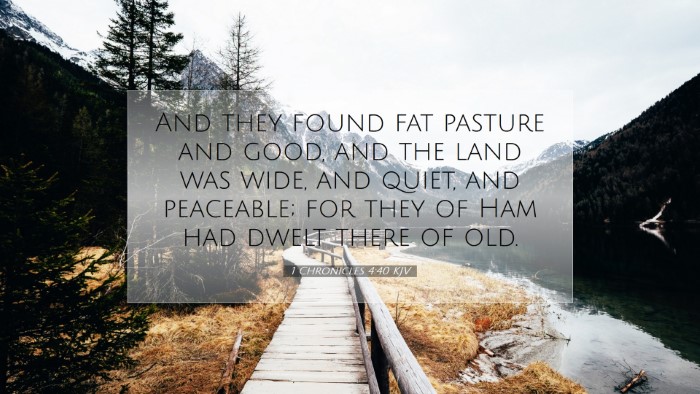Commentary on 1 Chronicles 4:40
1 Chronicles 4:40 states:
"And they found fat pasture and good, and the land was wide and quiet and peaceable; for they of Ham had dwelt there of old." (1 Chronicles 4:40, KJV)
Overview
This verse highlights a significant moment in the history of the descendants of Judah as they navigated their inheritance in the Promised Land. It recounts their discovery of a suitable place to dwell, emphasizing the abundant resources and tranquility that characterized the land. The historical context is vital, as it connects with the broader narrative of Israel's conquest and settlement.
Historical Context
1 Chronicles, like the rest of the books of Chronicles, was written after the Babylonian exile. The genealogies and lists in Chronicles serve to identify the returning exiles with their ancestors and to reinforce their identity as God's chosen people. The mention of Ham in this verse alludes to the descendants of Ham, one of Noah's sons, establishing a lineage of people that occupied the land before the Israelites.
In understanding the landscape of the scripture, it is important to recognize the various tribes of Israel and their allocations. The context of peace and good pasture symbolizes God's provision for His people during their settlement phase.
Commentary Insights
We can derive insights from several prominent public domain biblical commentators such as Matthew Henry, Albert Barnes, and Adam Clarke. Each brings unique theological perspectives and practical applications.
-
Matthew Henry:
Matthew Henry highlights the significance of finding a “fat pasture” as indicative of God’s blessing upon His people. He interprets “fat pasture” not only in the physical sense but also spiritually, noting that where God leads His people, there is abundance—both in physical needs and spiritual sustenance. The description of the land being “quiet” and “peaceable” reflects the peace that follows divine guidance and favor. Henry points out that the serenity of the land serves as a metaphor for the rest found in God, where there is no conflict or fear.
-
Albert Barnes:
Albert Barnes elaborates on the geographical and cultural aspects of the land during the time of settlement. He notes that the “land was wide” symbolizes not just the physical expanse but the opportunities for growth, settlement, and community life. In Barnes' view, this verse reassures believers of God’s provision and the hope that lies in His promises. The words “for they of Ham had dwelt there of old” prompts considerations on the sovereignty of God over nations and peoples, establishing nearly an implied contrast with the Israelites, whom God had chosen to inherit the land.
-
Adam Clarke:
Adam Clarke provides detailed exegesis on the particular nuances of the verse, suggesting that the term “fat pasture” indicates a land rich in resources, conducive for agriculture and herding—signifying sustenance and prosperity. He understands the peaceful condition of the land mentioned by “quiet and peaceable” as a divine provision for rest, aligning with theological interpretations of God’s covenant blessings. Clarke’s work emphasizes that this peace connects with the broader themes of God’s promises to Israel and their reliance on Him for peace in their lives.
Theological Significance
This verse captures core themes of divine providence and the fulfillment of the covenant. The Israelites’ journey from slavery in Egypt to a land flowing with milk and honey is a testimony of God’s faithfulness. The “fat pasture” symbolizes spiritual nourishment, while “wide and quiet” speaks to the peace that comes from living in the center of God’s will.
The presence of “Ham” in the narrative further provides a historical backdrop of coexistence with other nations and a reminder of God’s sovereignty over all peoples. It signals that the land possessed by Israel has deeper roots and history than just their own. This can encourage modern readers to reflect on their own spiritual inheritance and the multitude of graces available through faith and obedience.
Practical Applications
The qualities of the land described in this verse serve as practical metaphors for the Christian life:
-
Seeking Abundance:
Just as the Israelites found fertile land, Christians are called to seek out spiritual abundance through their relationship with God. Pastors and leaders may utilize this concept to inspire congregations to explore new areas of growth in their spiritual journeys.
-
Embracing Peace:
The tranquility of the land encourages believers to pursue peace in their lives, echoing the teachings of Jesus who said, “Blessed are the peacemakers.” (Matthew 5:9) This encourages efforts in reconciliation and harmony within church communities and relationships.
-
Understanding Our Heritage:
Recognizing the history of God's people can instill a deeper appreciation for the Christian faith. Knowing that one stands on the shoulders of generations before can inspire a commitment to faithfulness and stewardship of that legacy.
Conclusion
The verse from 1 Chronicles 4:40 is rich with insights into God’s provision and purpose for His people. The commentaries of Matthew Henry, Albert Barnes, and Adam Clarke augment our understanding by combining historical context with practical applications for the modern believer. As pastors, students, and theologians delve into this text, they are encouraged not only to uncover the layers of meaning contained herein but also to reflect on their own journey of faith in discovering the “fat pastures” of God’s rich bounty.


